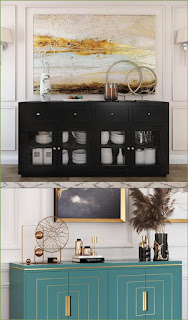How to build a buffet sideboard with stylish doors
Building Your Dream Buffet Sideboard: A Step-by-Step Guide
So, you're dreaming of a gorgeous, custom-built buffet sideboard? Something that's not only functional for storing all your serving dishes and linens, but also a stylish statement piece in your dining room or living space? You've come to the right place! Building a buffet sideboard might sound intimidating, but with a little patience and the right guidance, it's totally doable. Let's break it down, step-by-step, and create something you'll be proud of.
Planning Your Masterpiece: Design and Materials
Before we even think about sawing wood, let's get the creative juices flowing! This is the fun part â€" deciding on the style, size, and materials for your dream buffet.
Choosing Your Style
What kind of vibe are you going for? Modern minimalist? Rustic farmhouse charm? Elegant traditional? Browse Pinterest and Instagram for inspiration. Consider your existing décor â€" do you want the buffet to blend seamlessly or make a bold statement?
Think about the details: What kind of doors are you envisioning? Sleek, flat panels? Ornate raised panels? Glass-fronted doors to showcase your finest china? The possibilities are endless!
Sizing it Up
Measure your space carefully! How much room do you have? How much storage do you need? Consider the height of your dining table or other furniture it will be placed near to maintain visual harmony.
A good rule of thumb is to consider both the overall dimensions and the interior storage space. Do you need deep drawers for linens or shallow shelves for plates? Sketch out a plan, including the dimensions of each section.
Material Selection: The Heart of the Matter
The material you choose will dramatically impact the look and feel of your sideboard. Solid wood is a classic choice, offering durability and a beautiful natural grain. Popular options include oak, cherry, maple, and walnut. However, solid wood can be expensive.
Plywood is a more affordable alternative, offering good stability and the ability to be stained or painted to match any style. MDF (medium-density fiberboard) is another option, known for its smooth surface, but it's less durable than wood.
Don't forget the hardware! Handles, knobs, and hinges are the finishing touches that truly personalize your buffet. Choose styles that complement your overall design.
Construction: From Blueprint to Beauty
Now for the hands-on part! This section assumes you have some basic woodworking skills and tools. If you're a beginner, don't be intimidated; take it slow and carefully follow each step.
Cutting and Assembling the Carcass
Based on your design, cut the wood pieces for the sides, top, bottom, and shelves to the correct dimensions. Use a good quality saw (a miter saw is ideal) to ensure clean, accurate cuts. Assemble the carcass using wood glue and screws, ensuring everything is square and level. Clamps will be your best friend here!
Building the Doors
This is where your style choices come to life! For simple flat-panel doors, cut the panels to size and attach them to a frame using dadoes or rabbets (these are specialized joints). For raised-panel doors, you'll need to create the raised panel itself and fit it into the frame. This can be quite intricate, so consider using pre-made doors if you’re not comfortable with this stage.
Remember to account for the space needed for hinges when building your doors.
Hanging the Doors and Adding Hardware
Once the doors are built, carefully attach them to the carcass using hinges. Make sure the doors are aligned and open and close smoothly. Install the chosen hardware (knobs, handles) once you are satisfied with the door alignment. This is where a little patience will really pay off. A few adjustments might be needed.
Finishing Touches: Sanding, Staining, and Sealing
Sand all surfaces thoroughly to create a smooth finish. Apply stain or paint according to the manufacturer's instructions. Multiple coats are usually needed for a rich, even finish. Finish with a protective sealant to safeguard your sideboard against spills and wear and tear.
Beyond the Basics: Adding Extra Flair
Want to take your sideboard to the next level? Consider these additions:
Commonly Asked Questions
Q: What tools do I need?
A: You'll need a measuring tape, saw (circular saw or miter saw), drill, screwdriver, clamps, sandpaper, safety glasses, and possibly a planer or jointer depending on your chosen wood.
Q: How long does it take to build a buffet sideboard?
A: It depends on your experience and the complexity of the design. Allow ample time â€" a weekend project is unlikely, but a week or two for a more complex design is realistic.
Q: Can I use pre-made components?
A: Absolutely! Pre-made doors, drawer fronts, and even entire carcasses can simplify the process, especially for beginners. It's a great way to save time and potentially cost.
Q: What if I make a mistake?
A: Don't panic! Woodworking involves trial and error. Minor mistakes can often be sanded or filled. For bigger mistakes, it might require redoing a section. Learning from your mistakes is part of the process!
Q: Where can I find plans?
A: You can find free plans online (search "DIY buffet sideboard plans"), or purchase detailed plans from woodworking websites and magazines. You can also adapt existing plans to suit your needs and design preferences.
Building a buffet sideboard is a rewarding project. It allows you to create a unique piece of furniture that perfectly matches your style and needs. So, gather your tools, unleash your creativity, and get building! You’ve got this!

0 comments:
Post a Comment
Note: Only a member of this blog may post a comment.